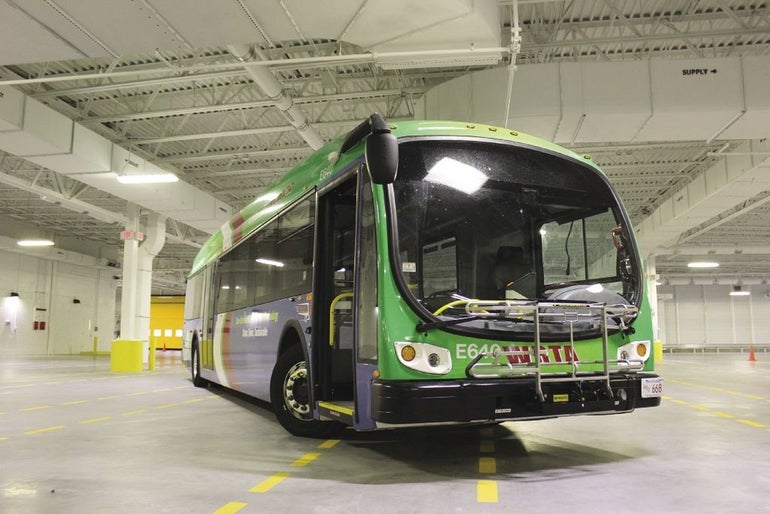The Legislature passed an infrastructure bill on Thursday that had been under negotiation for several weeks, padding the traditional $200 million in annual financing for local road and bridge repairs with $150 million spread across six grant programs to pay for bus lanes, electric vehicles and other municipal transportation projects.
The House and Senate passed the $350 million transportation funding bill unanimously, clearing one major item off the Legislature’s to-do list as it approaches the summer break.
Rep. William Straus, of Mattapoisett, and Sen. Joe Boncore, of Winthrop, negotiated the compromise (H 3903) after the House in late June and the Senate in early July passed competing versions of the legislation.
Both branches were seeking $200 million for the statewide municipal road repair program known as Chapter 90, which will deliver funds to all 351 cities and towns. That remained unchanged in the final bill.
“We know that our municipalities need this money and want this money,” Boncore said, adding, “Not just to get these roadway projects underway, but as we build out of the COVID-19 pandemic to stimulate the construction industry with jobs and economy around these projects.”
The Legislature, however, added spending for competitive grants after the House had pushed for $75 million for three different programs, and the Senate recommended $100 million in additional financing for four programs. The compromise funded all of the priorities sought by both branches, plus an additional $25 million for transit-supportive infrastructure, like bike and bus lanes.
“Philosophically, I think the Legislature’s goal here is to think of the state help to the municipalities in two ways. Not just the traditional Chapter 90, but we’re also now suggesting people think of state assistance in terms of these guided and directed programs for congestion issues, as well as public transit,” Straus said.
The Massachusetts Municipal Association and others have pushed for years to see the Legislature not only increase the amount of money authorized through Chapter 90, but also to pass a long-term financing bill that would allow projects to be planned out over multiple years.
Instead, the bill sent to Gov. Charlie Baker on Thursday put new funding into competitive grant programs that each have their own policy objectives.
Straus’s amendment authorized $25 million in additional borrowing for the municipal small bridge program, $25 million for the bottleneck relief program, $25 million for transit-supportive infrastructure, $25 million for municipal bus transit grants, $25 million for municipal mass transit access, and $25 million electric vehicles and electric-vehicle infrastructure that would be available to cities and towns, as well as regional transit authorities.
Though the annual Chapter 90 authorization is supposed to be made in the spring so cities and towns can sign contracts and take advantage of the full construction season, Straus said municipalities were notified of how much money they could expect and no projects were delayed.
“While we would have preferred it being done prior to July 1, no project has been delayed that anyone needs to be concerned about as a result,” Straus said in remarks to his colleagues on the House floor.
The amendment also included a new section making clear that $5 billion in state COVID-19 recovery funding received through the federal government is eligible to be spent on “maintenance or pay-go funded building of transportation infrastructure, including roads.”
Straus said the clarifying language was added to the bill “based on some indications that (the Baker administration) had made in writing that seemed to show a less than warm and inviting view toward transportation projects” being funded with American Rescue Plan Act money.
“The federal law makes it clear transportation is included, but for some reason the governor’s office has said they won’t recognize transportation. This is our way, as politely as we can, reminding them that they got it wrong,” Straus said in an interview..
The Executive Office of Administration and Finance issued a memo on June 3 to municipalities outlining the different ways counties and municipalities could spend $3.4 billion in direct aid through American Rescue Plan Act. The memo made no mention of roads or transportation infrastructure, nor did it suggest those uses would be prohibited.
Instead, the memo borrowed language directly from the ARPA law that listed drinking water, wastewater and stormwater infrastructure or the expansion of access to broadband internet as eligible infrastructure expenditures.
A spokesman for the Executive Office of Administration and Finance said at no time has the administration contested the eligibility of transportation projects for ARPA funds, which would be consistent with U.S. Treasury guidance on how states and local government entities can use the relief money.
Senate Minority Leader Bruce Tarr called the provision “odd,” and suggested it was “redundant” because he was unaware of anyone who disputed the eligibility of transportation projects. The Gloucester Republican, however, said he did not want to hold up the bill over his concern with that section’s inclusion.
The MBTA has received additional direct federal recovery funding from Congress, and Baker has filed a $2.9 billion plan to allocate more than half of the state’s ARPA relief money to housing, parks, wastewater system improvement and other priorities, but not transportation.
After a battle with Baker, the Legislature now has control of the state ARPA funds, and has scheduled its first hearing on how to spend the full amount for next week when it will listen to testimony on Baker’s plan.
The compromise road repair bill also excluded language that had been in the original House version of the bill requiring the Department of Transportation to maintain two operational commuter rail tracks on the Framingham/Worcester line during construction of an Allston I-90 viaduct project.
“There was a consistency issue here. We’re happy to support programs in general and there are likely to be other opportunities in the session for project specific work by the Legislature,” Straus said.

